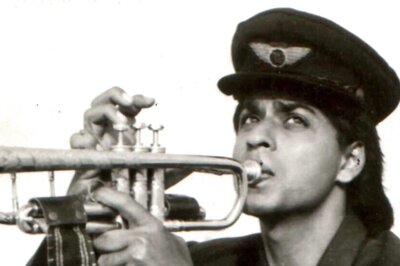
views
Tripoli: Muammar Gaddafi's government has promised the UN access to the besieged rebel city of Misrata, a senior UN official said on Monday, following weeks of heavy shelling of the city by Libyan government forces.
Such access is part of an agreement, reached Sunday, to enable the UN to deliver humanitarian aid in western areas of Libya under Gaddafi's control. The UN has already set up an aid operation in rebel-run eastern Libya.
Libyan government spokesman Moussa Ibrahim confirmed that the deal with the UN includes setting up a humanitarian corridor to Misrata, a city of 300,000 and the sole rebel holdout in Gaddafi-controlled western Libya. "The agreement is to provide safe passage for people to leave Misrata, to provide aid, food and medicine," Ibrahim said late on Sunday.
The Libyan government has denied it has used heavy weapons against Misrata, where rebels are clinging to positions near the sea port, their only lifeline to the outside world.
However, residents and hospital officials in the city have described heavy shelling over the weekend, and said 17 people were killed Sunday. UN officials said children and elderly people have been among the casualties in recent days.
UN Secretary-General Ban Ki-moon on Monday appealed to Libyan forces to hold their fire. "Considering the magnitude of this crisis, and as this fighting is still continuing, it is absolutely necessary that Libyan authorities stop the fighting, stop killing people," he told a news conference in Budapest, Hungary.
Ban said the basic needs of tens of thousands of people in Libya are not being met.
He said the UN will have a "humanitarian presence" in the Libyan capital of Tripoli, which is under Gaddafi's control. From Tripoli, the UN will try to expand operations with the help of the Red Cross and others, Ban said. He did not elaborate.
The UN has already set up an aid operation in the rebel stronghold of Benghazi.
Valerie Amos, the UN humanitarian chief, said she has received assurances from government authorities in Tripoli that the UN would be allowed into Misrata.
"What I would like to do is get access to Misrata, not just from the sea, but also from the road," Amos told reporters in Benghazi. "We have very little sense of what is going on across the city."
Ibrahim, the Gaddafi government spokesman, said the agreement with the UN also calls for free access of international aid agencies and ensuring that electricity, water and other services are provided to Misrata. City residents have said supplies have been severely disrupted.
Also Monday, nearly 1,000 people who are among several thousand stranded in the area of Misrata's port boarded an aid ship sent by the International Organization for Migration.
Most of the passengers were migrant workers, but also included 100 Libyans, among them 23 wounded in the fighting. The injured included a child shot in the face and an amputee, the aid group said.
"We wanted to be able to take on more people, but it was not possible," said Jeremy Haslam, who heads the group's boat rescue. "Although the exchange of fire subsided while we were boarding with an eerie silence at one point, we had a very limited time to get the migrants and Libyans on board the ship and then leave," he said.
The organization said at least 4,000 additional migrants are stranded in the port area, including women and children.
Many of the refugees have been living out in the open or in containers in the port area for nearly two months, lacking access to water and medical and running short on food. IOM said many of the migrants are weak and dehydrated.
Haslam said the group needs funding for a bigger boat to rescue the remaining migrants in one trip.
Libya's fighting, which erupted two months ago, has reached a deadlock, with neither side able to gain a decisive advantage and the front line shifting back and forth across a stretch of desert near the eastern city of Ajdabiya.
On Monday, rebel fighters and Gaddafi's forces battled for a second consecutive day around Ajdabiya, exchanging light volleys of artillery and rocket fire near the city's western gate.
One of the rebels' staunchest supporters is the Gulf state of Qatar, which has given them diplomatic and financial backing. Late Sunday, the leader of the rebels' transitional government, Mustafa Abdul-Jalil, arrived in Qatar, the official Qatar News Agency reported. Abdul-Jalil was met by Qatar's foreign minister.
"I'm here to thank the Qatari government and people for the humanitarian and brotherly position, which had a strong echo in the hearts of all Libyans," the rebel leader said.
In Benghazi, the top rebel oil official said the rebels will not sell any additional oil until production resumes from two key fields that suffered battle damage.
The repairs - which rebels say could be completed in weeks - are a priority for opposition forces that are counting on oil revenues to help maintain the fight against Muammar Gaddafi's stronger military.




















Comments
0 comment